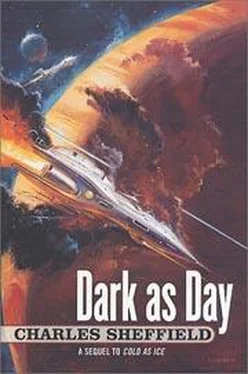His lifestyle and work habits were legendary. Rising at three, he ate a simple breakfast and proceeded at once to his office in a dark corner of the company’s corporate facility. There he sat at a cluttered desk and worked, through the day, through the evening, and on late into the night. No task appeared boring to him when it involved financial elements. Numbers were the donkey’s passion, and apparently numbers alone. It was rumored — and probably no more than rumor — that he disliked computers, and performed his voluminous calculations by hand. When he ate it was infrequently, alone, and in random amounts.
“The contract provides an option,” Prosper went on, “to continue the work and collect the helium-3 needed to fuel Starseed-Two. That leaves us with a difficult decision.”
Alex did his survey of the family members present. Around the table, to his left, were his mother Lena, then the two childless great-aunts, Cora and Agatha, and then Cousin Hector Ligon, with two empty chairs between him and Prosper Ligon. Two more empty seats lay on Prosper’s left. The other four places were occupied by girl cousins Juliana, Rezel, and Tanya, and in the place to Alex’s right Uncle Karolus sat scowling down at the table.
“It’s obvious what we do,” Karolus growled. “We get out now, and cut our losses. We should never have taken that bloody contract. I was against it.”
As Alex recalled, his uncle had been the one who pushed hardest for taking on the Starseed contract. However, Prosper Ligon did not choose to argue. “Perhaps you were opposed,” he said. “So was I. And if, five years ago, we had known about the difficulty of mining Jupiter’s atmosphere, even with the best Von Neumanns available, then everyone at this table would surely have sided with us. That, however, is history. The number of Von Neumanns lost during ascent from Jupiter wrote red all over our balance sheet.”
Cousin Juliana was interested only in certain things, but company finance was one of them. If Uncle Prosper ever retired — or, more likely, his dead body was dragged away from his desk to the knacker’s yard — then she was a logical candidate to take over. She said, “The Von Neumanns are not much better today than they were three years ago. If it was a loss operation then, it will still be one. How much of a disaster?”
Prosper Ligon’s voice did not waver. “We sacrificed approximately twenty percent of Ligon Industries’ total assets.”
Cousin Hector said, “Wow!”
“Wow, indeed.” Prosper Ligon nodded slowly. His head seemed a size too large for his skinny neck. “However, I am in favor of accepting the contract option to provide helium-3 for Starseed-Two.”
Eyebrows were raised all around the table.
Hector had his brow furrowed in obvious thought. He glanced at his cousins, but his comment was directed to his great-uncle. “You’re going to lose all our money!”
“Thank you, Hector, for that acute observation. Such, however, is not my intention.”
Cousin Juliana, as usual, came in on Hector’s behalf. “Do you think that our learning curve on the first contract was steep enough to turn another one profitable?”
“We are certainly more familiar with the Von Neumanns’ performance, and with other risk factors. But the big changes are elsewhere.” At Prosper Ligon’s gesture, the lights in the room dimmed. In the display volume behind him appeared an image of Jupiter with its train of satellites.
“Mine Jupiter for helium-3,” he said softly, as though talking to himself in the dim light. “It seemed like the right decision at the time. The isotope is more abundant there than anywhere else in the System. We could construct Hebe Station, for docking of the loaded Von Neumanns and their general service. Ganymede was close enough for overall command and control. We could see acceptable profit margins. There was one great problem, and it was an invisible one.” He swiveled to point at the display. “Jupiter itself. Or rather, Jupiter’s gravity field. The escape velocity from the upper atmosphere is sixty kilometers a second. The Von Neumanns were strained to the limit, and in many cases past the limit. Their loss and the accompanying delays were largely responsible for our financial losses.”
“Hmm.” Karolus snorted from the other end of the table. If Prosper Ligon was a donkey, Karolus was a bull. “The Von Neumanns are no better than they were, you just admitted that. And Jupiter was still the same size, last time I looked. I haven’t noticed any change.”
“Nor have I. But there have been other changes.” Prosper Ligon made some unseen gesture, and the glowing image of the Jovian system vanished. “Every year,” he said in the darkness, “human civilization advances a little farther outward. Every year, the available resources beyond Jupiter increase.”
The room brightened again with light from the display volume, but it had changed. Now it showed another planet, recognizable as Saturn from the flattened disk, complex ring system, and attendant moons.
“The atmosphere of Saturn also contains an abundance of helium-3,” Prosper went on. The escape velocity is thirty-six kilometers a second — substantial, but little more than half that of Jupiter. This difference creates a vast change in the economics. I have performed a financial assessment. If we switch to Saturn as the source of fuel for Starseed-Two and move the ship itself and our own operations there, we will recoup all the losses suffered on the contract to date.”
The rest of the room went dead silent. At last Lena Ligon ventured, “You mean — leave Ganymede?”
The last upheaval had been close to half a century ago, when Gonville Ligon had moved family and empire from the bustling metropolis of Buenos Aires to the stark caverns of Ganymede. That transition had taken place over the strenuous objections of everyone. Gonville, a true descendant of iron-man Alonzo Ligon, had refused to listen. He simply said, “The future of industrial development isn’t on Earth, or even on Mars. It’s in the Outer System. That’s where we’re going. Anybody who doesn’t want to come along, bugger them. They can stay behind and try to scratch out a living on Earth.”
The Great War had proved Gonville right in a way that he had never anticipated. Now Prosper allowed himself a dry little neigh of amusement. “No, no, not at all. I am not proposing relocation. Most of us will remain here. The Starseed operation will move out. As to our base there, I have examined the choices.”
His display control marked out the nine major Saturnian moons, ranging from Mimas to far-out Phoebe. “None of these. They are all, together with the co-orbiting companions of Tethys and Dione, either under development or subject to lease arrangements. They are also inconveniently distant from Saturn. My own first choice is this one. Its period is about half as long again as a Saturnian day, which will make for easy rendezvous with Von Neumanns arriving with helium-3 cargo.” The marker flashed onto a bright point that showed as the middle in distance of five small satellites. “The moon currently has a leaseholder, but every previous assay has indicated no useful resources. We should be able to make a tempting offer.”
So far as Alex knew, no member of his family had ever taken the slightest interest in the sprawl of the Outer System beyond Jupiter. That idea was confirmed when Great-aunt Cora glared at the illuminated point and said, “No offer for that thing could tempt me. What’s it called, and why do we need it? Why not build our own base of operations?”
“It is known as Pandora. As to why we need it, that is a most astute question.” The long donkey-head nodded appreciation at Great-aunt Cora. “We need Pandora because the current leaseholder is apparently a misanthrope of the most extreme kind, who has been dealing with a government official who is either a buffoon or a hater of corporate activity. The lease permits government activity closer to Saturn than Pandora, but the leaseholder has the right to prohibit industrial operations. Operations which are, of course, for us an absolute necessity.”
Читать дальше












